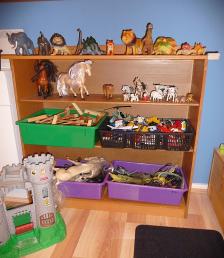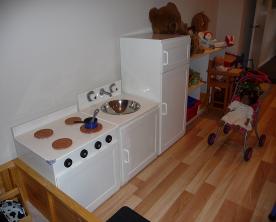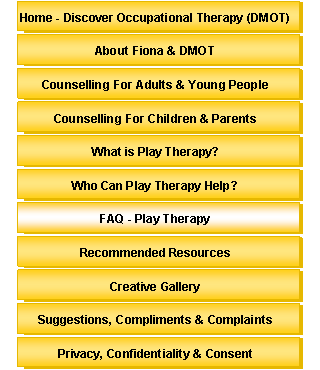|
Frequently Asked Questions About Play Therapy |



|
What is a Play Therapist? A Play Therapist is a child health professional who has specialist skills to provide therapy to children with emotional, social and behavioural difficulties. The Play Therapist provides a safe and accepting place that encourages a child to explore and work in. The therapist reflects the child’s efforts to grow and develop and notes changes that occur.
What is a Playroom? My counselling office has a large playroom where I see children for play therapy. The playroom provides a child-friendly environment equipped with a sandpit, painting easel, creative materials, puppets, dress up clothes, miniature figures and an extensive range of therapeutic toys. These toys are carefully selected to allow your child to play out themes of real life, safely express their feelings and allow creative expression. Play is the language of children, and when toys or play media are used, the item chosen by the child can communicate messages and feelings which can be difficult for the child to communicate verbally. What happens in a Play Therapy session? Play Therapy sessions last about 50 minutes because play therapy is hard work and for most children this is ample time to think about or experience different feelings. Sometimes if your child is anxious about leaving you, you and your child may come into the playroom together initially. When your child feels comfortable with you leaving the playroom, the rest of the session and following sessions are conducted with your child and myself only in the playroom. This allows your child to freely express their feelings and concerns without the worry of upsetting you. In Play Therapy your child selects the toys and activities to play with. The Play Therapist may join in the play with the child’s invitation or direction. In a typical play therapy session, the Play Therapist will be reflecting about how your child is engaging with toys and the underlying emotions which seem to accompany the actions rather than asking questions. Limits are set as and when needed. This is done in a way to help your child make choices and develop self responsibility. How does Play therapy help? A child does not have to talk directly about their problems or feelings to gain relief. In Play Therapy children are provided with specially chosen toys to enable them to say with toys and through play what they have difficulty saying in words. This allows children to distance themselves from difficult feelings and memories but through expression these feelings and memories may become less intense. Play Therapy allows your child to play out their worries and concerns with support from the Play Therapist. Sometimes they may re-enact traumatic or difficult life experiences in order to make sense of their past. Play Therapy allows children to change the way they think about, feel toward, and resolve their concerns (Kaugars & Russ, 2001). Play Therapy can help parents, teachers and caregivers to understand what their child is going through and suggestions can then be given to assist the individual needs of the child. Troubling problems can be confronted in play therapy and lasting resolutions can be discovered, rehearsed, mastered and adapted into lifelong strategies (Russ, 2004). How do I prepare my child for their first Play Therapy session? Tell your child that they are going to play with a person called Fiona in a special playroom with lots of toys each week. This is usually enough. If your child wants to know more say “When things are hard for you at home (and/or school), sometimes it helps to have a special place to play.” With older children I will spend some time with you present talking about the reason the child is coming to Play Therapy. What if my child won’t stay or settle in the playroom? Some children find it difficult to separate from their parent or caregiver. Initially you may join your child in the playroom but not become involved in your child’s play. Your presence will reassure your child about his or her new situation. The Play Therapist will guide you and, when appropriate, suggest you leave the room. What clothes should my child wear to their Play Therapy sessions? What else would be helpful? Please dress your child in old clothes and shoes so he or she does not have to worry about getting paint, sand or water on them. If you are coming from school, I would suggest you change your child into old clothes as then your child will feel freer to play in the playroom. I recommend your child goes to the toilet and has a light snack and drink before and after the Play Therapy session. When you bring your child I ask you not to discuss with me what is happening or has happened during the day or week as this is his or her special time. You are welcome to phone with any concerns you may have at another time. Do I need to wait whilst my child is in their Play Therapy session? Yes, it is important your child knows you are waiting in the waiting room and that we can come and check should he or she needs to do this. Please feel free to make yourself comfortable and enjoy some time for yourself. What should I say to my child when their Play Therapy session has finished? You are very important in supporting your child through the process. Resist the urge to ask your child about their Play Therapy session or if they had fun. You could say “Hi, we can go home now.” If your child wants to tell you they are most welcome to and respond by showing interest but do not ask questions. Allow your child to lead the conversation. If your child is quiet after a session follow their lead as they may be continuing to think and process the session. If your child brings artwork out of the playroom try to comment on the colours rather than praising or interpreting the work e.g. “you have used lots of different colours” or “it looks like you’ve spent a lot of time doing your picture.” How will I know how my child is going in his or her Play Therapy sessions? After the first session I will let you know how your child was in the playroom. We will discuss your child’s progress regularly. In this Play Therapy approach we do not generally talk about your child’s specific play in order to maintain your child’s trust and feelings of safety with the therapist. I will talk with you about the play themes and the stage of the play therapy process your child is at. If something arises in a Play Therapy session that I am concerned about, I will give you a phone call. If anything happens between sessions that are traumatic, potentially disruptive or very positive for your child, I would appreciate you letting me know this by phone. During therapy your child’s behaviour may appear to get worse before it improves. Please feel free to discuss any concerns you may have. I will also discuss with you ways you can assist your child related to observations made in Play Therapy and their developmental needs. What’s the difference between Play Therapy and playing with my child at home? Play Therapy is not the same as playing. Play Therapy uses your child’s natural tendency to “play out” their feelings, worries and life situations in the presence of a specially trained Play Therapist. The Play Therapist helps the child to feel accepted, understood and gain a sense of control or understanding about difficult feelings or situations. How long does Play Therapy take? Play Therapy is at your child’s pace at which she or he is comfortable with. Sessions are weekly or as mutually agreed at a regular time scheduled for your child as this becomes your child’s special time and this predictability and consistency is important to support the Play Therapy process. Unplanned missed sessions may disrupt the process. The length of time for therapeutic gains to be achieved and maintained varies with each individual child. Ending Play Therapy sensitively is important. Endings take place over several sessions. Premature or unplanned endings are not recommended. Therapy is no longer required when your child’s presenting problems have resolved for a consistent length of time as reported by you, their school and significant others and he or she is no longer playing out their problems.
|

|
“You can discover more about a person in an hour of play than in a year of conversation” Plato |
|
Play Therapy is counselling for children |
|
Discover Me Occupational Therapy
|

|
Play Therapy for Children Counselling for Adults & Children |
|
The Playroom |





|
“To play it out is the most natural self - healing process in childhood”
Erik Erickson |
